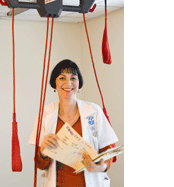Pain and the Relation to Treatment with Cannabis

Prof. Ruth Djaldetti
From: The Spokesman Department | Rabin Medical Center - Beilinson and Hasharon
January 13, 2013
50-80% of people with Parkinson's disease suffer from a specific type of pain, which until today has not been diagnosed and treated as a general part of this disease.
A study recently conducted at Rabin Medical Center by Prof. Ruth Djaldetti, senior neurologist and head of the movement disorder clinic has found a genetic link which could explain this pain and the relation to treatment with cannabis.
The research examined eight genes known to be involved in pain, among 237 patients with Parkinson's disease. They found that those suffering from this type of pain have gene sequence changes associated with the activity of cannabis-like substances produced in the brain and another gene associated with pain transmission. According to Prof. Ruth Djaldetti, the results of the study support the approach that patients suffering from this type of pain might be able to find relief by treatment with cannabis and have a better quality of life. These initial results should now be more extensively studied in order to arrive at more conclusive evidence.
Prof. Ruth Djaldetti expects that in the future it will be possible to adjust medical treatment as according to the mapping of individual genes.
The study was published in the European Journal of Pain.
Related Articles
Hip Hop...
As one of the leading departments of orthopedic surgery in Israel, the Orthopedic Department at Rabin Medical Center treats patients of all ages including many young soldiers of the Israel Defense Forces. They use the most advanced medical techniques for the benefit of all their patients.
Japanese Healing Art Enhances Birthing Process
The Schneider Women's Hospital at RMC strives to provide new and modern techniques to enhance the birthing process, and has now introduced the use of shiatsu techniques.
Less Anxierty Improves In Vitro Fertilization
For many women who have difficulty getting pregnant, the in vitro fertilization (IVF) process can be extremely stressful and all consuming.